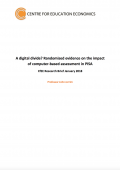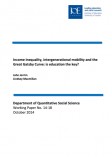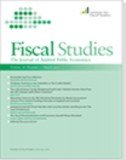A beginner's guide to Professor John Jerrim
Where does he work?
John Jerrim is a Professor of Education and Social Statistics at the University College London Institute of Education. He is a significant contributor to the OECD Programme for International Student Assessment (PISA).He completed his PhD in social statistics at the University of Southampton in 2011 and was honoured as being the "most promising PhD student in the quantitative social sciences" by the institution, as well as being awarded an ESRC research scholarship to complete his doctorate. Subsequently, he became the first recipient of the ESRC Early Career Outstanding Impact award.
Quick facts:
Born:
Nationality:
Website:
Twitter:
Professional Bio:
What is he best known for?
His continuing work with PISA, a tri-annual OECD assessment which draws comparisons between the attainment and social mobility of students by country. Independently, Professor Jerrim is noted for his pioneering research into cross-generational social mobility and inequality in education.
What's it all about?
The OECD Programme for International Student Assessment has been conducted tri-annually since 2000 and aims not only to publicise the success of teaching and learning in individual nations, but also to investigate the reasons for their success and share best practice with the rest of the world. For example, this year the PISA named Canada as an educational superpower, noting that it boasts the largest proportion of adults to have studied at university, as well as three regions that rank in the top five for attainment in science and, on their own, overtake the likes of Finland and Hong Kong. The PISA identified a number of reasons for this - notably, significantly less socioeconomic inequality than comparator nations. Specifically, Jerrim's research noted a rapid integration of migrant children and their families, leading to equality of achievement with the indigenous family. It argued that a commitment to 'equality' and a 'fair chance' for all children in Canada is a contributing factor to the success of its learners regardless of their background, as well as a well paid and highly selective teaching profession. Some academics have criticised the methodology uses in Pisa, and while Jerrim concedes that some of this criticism may be valid,he points to the strong correlation between student performance in Pisa and key stage 3 maths exams – and between Pisa and other tests such as TIMSS.
What does he research?
As well as regularly contributing to one of the largest studies of educational performance in the world, Professor Jerrim has applied his research into the high performance of students from international countries to the challenges faced by the UK's education system. As a devoted advocate of socioeconomic equality, Jerrim has identified several key contributing factors to the failures of UK schools and pushed for the 'lessons learned' from other nations to be implemented. In 2012 he produced research arguing that, in the UK, richer children were academically two years ahead of 'clever' children from poor backgrounds. This year, he produced more research to support this claim and noted that nations with lower income inequality do not produce children with the same disadvantages. To combat this, he suggests that unemployment in the UK must be tackled, claiming that households of 'low productivity' influences the attitudes of the children who grow up in them.
What he says:
"Education policy over the last decade has focused considerable attention on improving the attainment of less able children from poor backgrounds, with some success. Now policymakers must turn their attention to reducing inequalities in educational achievement amongst the brightest children in society, to ensure that those from disadvantaged families are not left behind."
What others say:
"John Jerrim has reframed the debate on school pupils' academic achievement." Economic and Social Research Council
"A great feature of research by John Jerrim's that he looks at the evidence before pronouncing." Nigel Williams, Civitas.
"[John Jerrim] seems like an extremely prolific scholar and has done loads of research on PISA. As important, he seems to be working closely with education
Why you should consider reading more:
Professor Jerrim's rapid ascension within the field of educational research (at age 33 he is already a Professor) is a testimony to the significance of his work. He is a leading researcher for the PISA, and it his deep research into the attainment of students on an international scale that influences his judgement when he advocates for the educational practices that he believes should be adopted in the UK. His research focusses on the challenges faced by children in the UK, and what he lacks in solo-authored publications he makes up for with his work's resonance in the UK press and influence on government policy. As someone whose research is heavily influenced by the success stories of foreign nations, and with inequality a hot topic on the party political stage, Professor Jerrim's work is vital reading for lawmakers and practitioners seeking to tackle the ways in which the UK's education system falls short.
Top reads:
Related Posts
Comments
By accepting you will be accessing a service provided by a third-party external to https://edcentral.uk/






